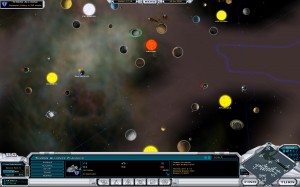261st played so far
 Genre: Strategy
Genre: Strategy
Platform: PC
Year of Release: 2006
Developer: Stardock
Publisher: Stardock
We like 4X-strategy games, Civilization and its successors. I also like Sci-Fi. Galactic Civilizations II, which pretty much combines the two, sounds like a good game for that very reason.
Despite possible appearance, this game has little in common with Sid Meier’s Alpha Centauri. It’s not Civ on a futuristic planet, it’s Civ spread out of lots of planets, more like, for example, the Master of Orion series (which we sadly will not get to blog about).
Our Thoughts
So let’s start with our elephant in this write-up. While playing the game, we had a few crashes (locking up our PC), which rather soured us on the game. Based on our investigations, this seemed to be because we were playing on an immense map – the game eats up too much memory that way sometimes. Considering the specs we’re running on, this seems to be a game bug that’s been observed by others, but gone unpatched. A shame, really.
Not only did it crash then but whilst trying to play on my own to get a grip of this game it crashed twice whilst I was on the main selection screen. So I just thought ‘screw this’ then sat in the corner and pouted.
The frustrations this caused meant that we didn’t play the game as in-depth as we could have – we normally would have tried to at least finish a game. After three or four crashes, it was too much for us and didn’t feel worth it.
So now that’s said, what about the game? First of all, it’s a gorgeous game. The ships are lovely and detailed, with options we’ll go into later. Deep space is beautiful, and the stars and planets are a treat – exploring and finding different ones is enjoyable on their own. You can see a number of them in the screenshots on top, the variety inside the game is even greater.
So about those ships. Like other games in the genre your units (space ships here) are customizable. This is more than just combining vehicle options though (although mechanically that is what it comes down to). Aside from your useful added modules having different places where they can appear on the ship, you can also pick your own hull and pick other sorts of accessories. You turn, size and place them where you want them and with that you can create your own personal ships. It’s a neat feature to allow you to make your fleet your own and we spend some time just playing around with it.
Gameplay then. The basics of the genre are there. Build buildings, build structures, explore, deal with people you encounter and so on. One of the main things I noticed, however, is that of scarcity. First, there’s the trivial – your planets get limited slots to build stuff in, less than most games, which means that on all but your most prosperous planets, you really need to think about what to focus on.
More important, however, is the scarcity in resources. Everything runs off the same money counter, which is quite stringent early on – everything seems to cost money and it’s difficult to balance research (which you want to be able to do anything – you can’t even build military ships early on), ship building (to colonize and gather resources) and planet development (including buildings that improve your profit). It’s a tough balancing act that we hadn’t quite managed to pull off yet.
The amount of options, though, is amazing, making it even more difficult to decide what to focus on. The victory conditions sort of outline some of the styles although you’ll be familiar with most of them and combine them during your playthrough. There’s the standard military victory and the research route. You can get your diplomatic victory and your influence one. Later expansions add the ascension victory, won by keeping control of particular resources for long enough (we actually were about a 100 turns in on that by the time we left the game).
But the most fun for me really was just sending my survey ships around, exploring the galaxy and finding out what else was out there. If only that had been a bit more stable…
Final Thoughts
We’ll get to this game’s sequel, Sins of a Solar Empire, at some point, which will hopefully cause us less problems.
When we got into playing the game, it was deep and frustrating. The extended focus on economics and world building we encountered was interesting and fun, more frustrating, but meant we had to pay a lot more attention than when you steamroller through in any Civ game. Commendable for that alone, with the setting just adding lovely flavour (thanks Cilan).
Playing this just reminded me how much I want to play Spore and once we leave Jeroen’s 50 this will be a game we will be playing this very soon.
[…] sure they’ll push the right buttons. Sins of a Solar Empire is a spiritual successor to Galactic Civilizations, a 4X game we enjoyed but that was unfortunately too unstable for us to play for […]
[…] I’ve played plenty of grand tactics games set in space – Galactic Civilizations and Sins of a Solar Empire come to mind, as well as Stellaris which I really need to dive further […]